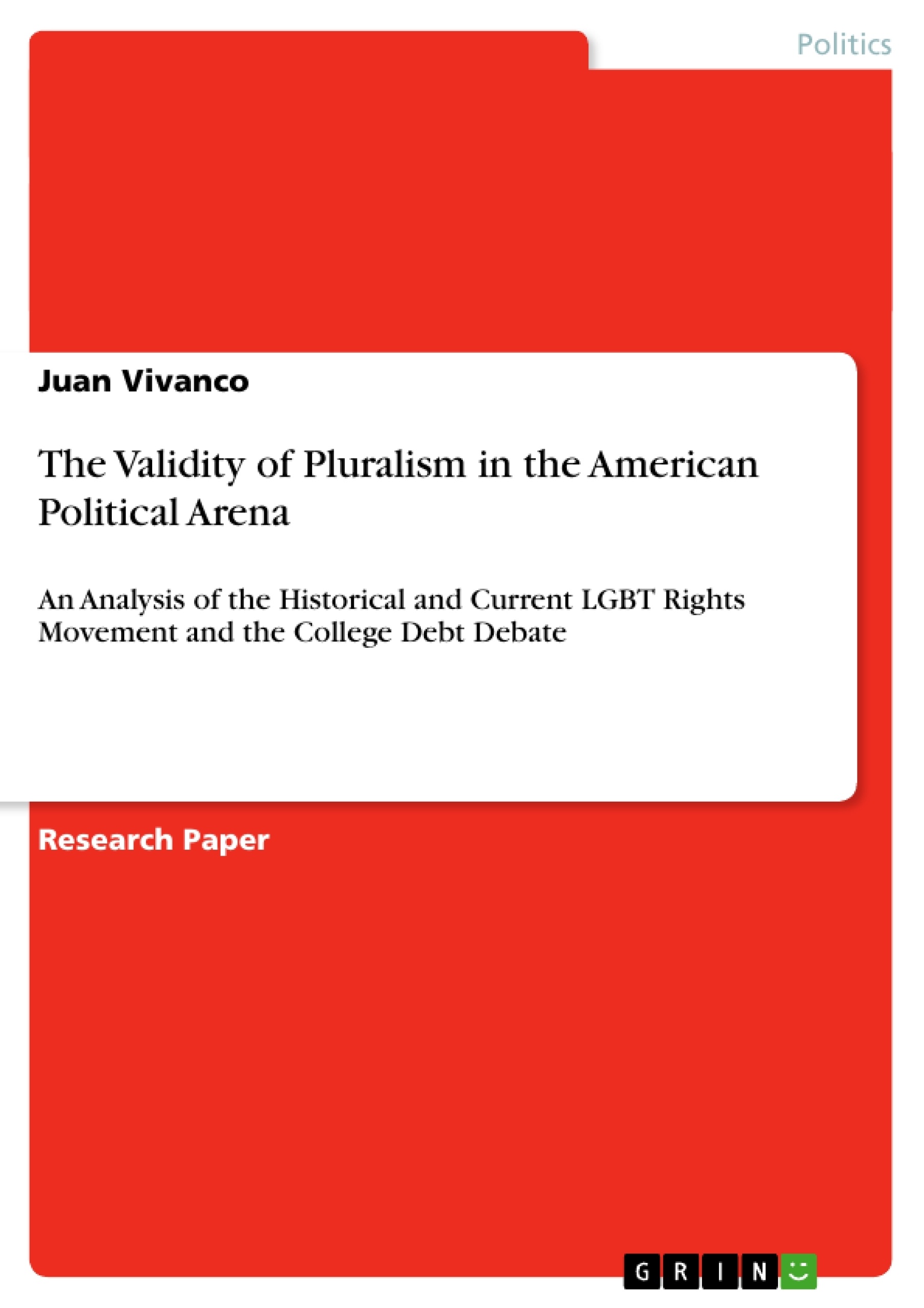This essay will explore the extent to which pluralism accurately describes and predicts the policy-making process in the United States, taking into consideration a particular theoretical framework. It will do so by considering two different policy issues: gay marriage, on the one hand, and college debt, on the other. Gay marriage will be considered in the context of the recent declarations of President Obama in favor of it. A historical landmark, the support of gay marriage by an American president has done much to move public debate towards its acceptance (Nagourney). College debt, on the other hand, has become an increasingly important political matter in the last years, as its aggregate amount has surpassed the historically-important household credit debt (Steinhauer and Lowrey). Within college debt, the debate on the raise of subsidized interest rates will be closely analyzed. Both cases will consider to what extent each relevant actor has had a say in the policy-making process, and the relative weight of their input in shaping final policy outcomes.
Inhaltsverzeichnis (Table of Contents)
- Pluralism and Democracy: A Marriage Made in Heaven?
- Gay Marriage in the United States: past and present
- Pluralism and the early LGBT activism efforts
- The LGBT rights movement and their success in the last decade
- Pluralism: in sync with the LGBT movement?
- College Debt: Are Students Heard?
- The upcoming presidential elections and its influence on college debt policy
- Pluralism: Is Everyone Really Heard in Democracies?
Zielsetzung und Themenschwerpunkte (Objectives and Key Themes)
This essay explores the validity of pluralism theory in the American political arena by analyzing two contrasting policy issues: the historical and current LGBT rights movement and the debate surrounding college debt. The goal is to determine the extent to which this theory accurately describes and predicts the policy-making process in the United States.- The application of pluralism theory in the context of the American political system
- The role of interest groups in shaping policy outcomes
- The influence of power differentials and elites on policy decision-making
- The impact of public opinion and electoral pressures on policy development
- The tension between the theoretical framework of pluralism and real-world political practices
Zusammenfassung der Kapitel (Chapter Summaries)
This essay argues that while pluralism theory might offer a useful framework for understanding some aspects of the American political process, it often falls short of providing a complete and accurate account of the policy-making process. The essay explores the validity of pluralism theory through the lens of the LGBT rights movement and the college debt debate. In the case of the LGBT rights movement, the essay highlights the significant time lag between the rise of LGBT activism and the achievement of anti-discrimination legislation. This gap is attributed to the concentration of power within a limited group of elites who held opposing views, effectively silencing the voices of the LGBT community for an extended period. While recent years have seen rapid progress in the movement towards same-sex marriage, the essay questions whether this shift represents a true embrace of pluralistic principles or is simply a reflection of politicians responding to changing public opinion and electoral pressures. The essay then examines the debate surrounding college debt, specifically the issue of keeping Stafford loan interest rates low. The essay argues that the bipartisan support for this measure reflects a key tenant of pluralism theory: politicians responding to the demands of a crucial segment of the electorate – students. However, the essay also points out that the political climate leading up to the 2012 presidential election played a significant role in driving this support, raising questions about whether student voices were truly being heard or if politicians were simply leveraging the issue for political gain. Ultimately, the essay concludes that while pluralism theory provides a useful starting point for understanding the American political system, it cannot fully account for the complexities of power dynamics, the influence of elites, and the shifting nature of public opinion. The essay suggests that a more nuanced understanding of the American political landscape is required to truly grasp the extent to which all voices are heard and represented.Schlüsselwörter (Keywords)
The essay centers on the following key terms and concepts: pluralism, political theory, policy-making process, interest groups, elites, power differentials, LGBT rights, college debt, public opinion, electoral politics, and the American political system.Frequently Asked Questions
What is pluralism in political theory?
Pluralism is the theory that political power is distributed among a wide variety of interest groups that compete to influence policy outcomes.
How does the LGBT rights movement illustrate pluralism?
The essay examines how LGBT activism shifted public debate and influenced policy, such as same-sex marriage, through interest group pressure and changing public opinion.
Is the college debt debate a sign of pluralist success?
The essay argues that while student demands are heard, the response is often driven by electoral pressures and the influence of political elites rather than pure pluralism.
What are the criticisms of pluralism mentioned?
Criticisms include the concentration of power among elites, the time lag for marginalized groups to be heard, and the fact that not all voices have equal weight in policy-making.
How do electoral pressures affect policy-making?
Politicians often respond to interest group demands (like students or activists) primarily when they need to secure votes for upcoming elections.
- Arbeit zitieren
- Juan Vivanco (Autor:in), 2012, The Validity of Pluralism in the American Political Arena, München, GRIN Verlag, https://www.grin.com/document/229481



